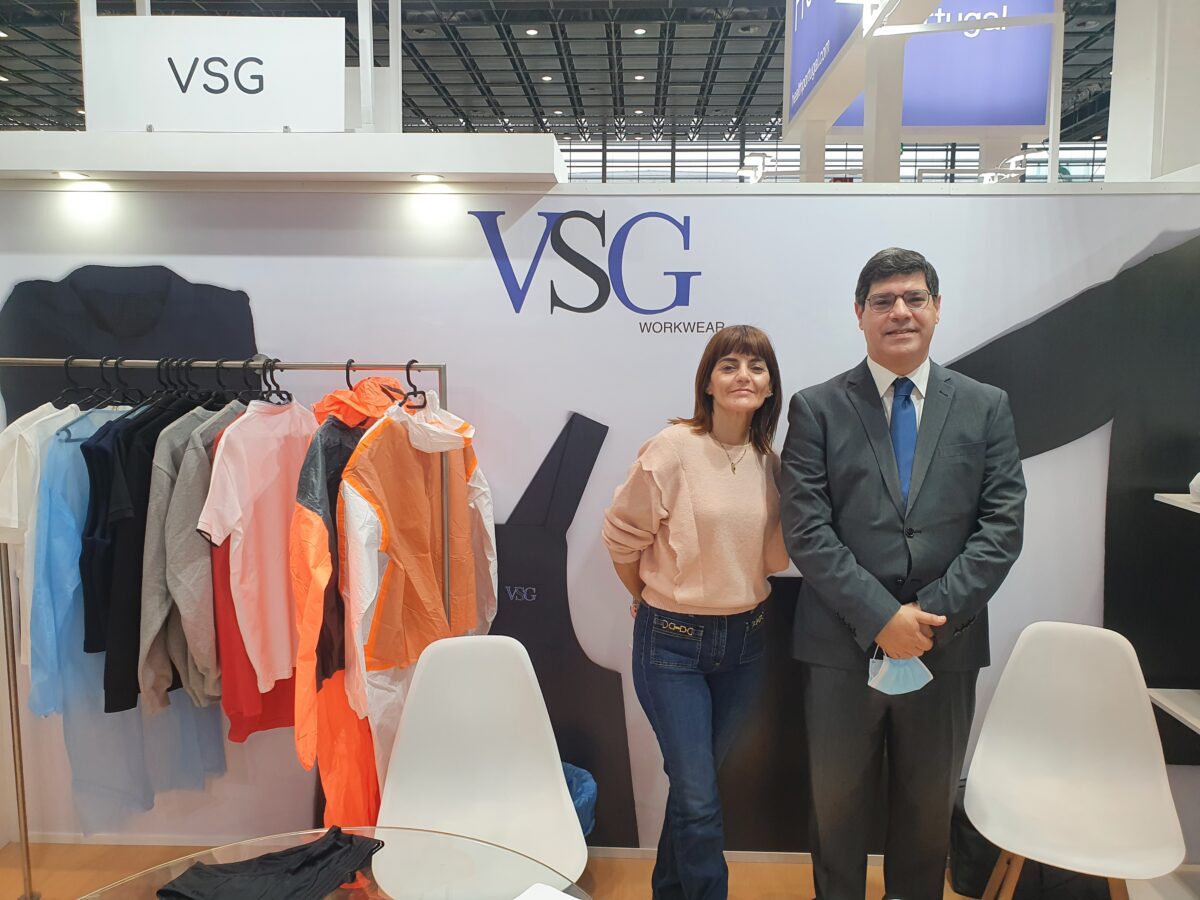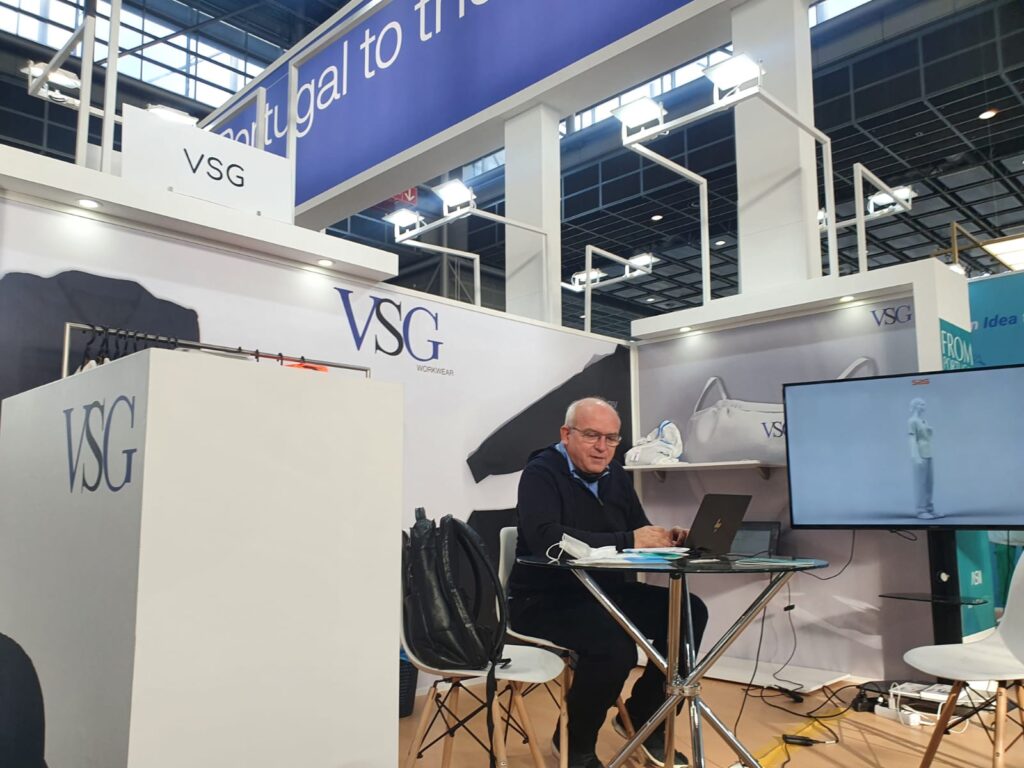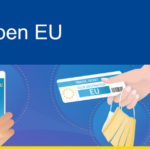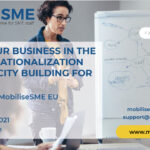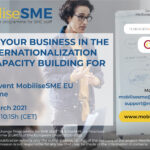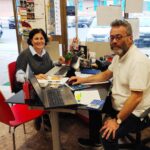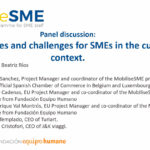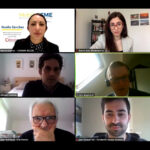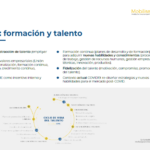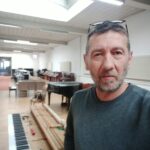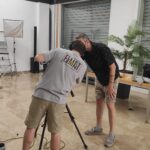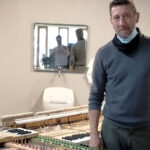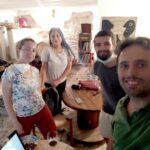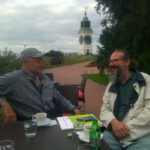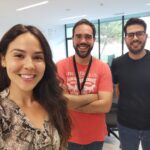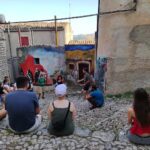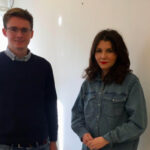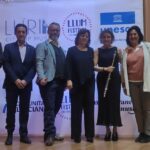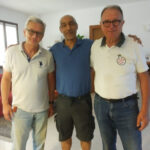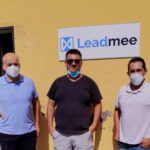MobiliseSME supports innovation and research in Europe’s textile SMEs
This time we share with you an interview with Hervé Francois and Fátima Oliveira, two representatives of SMEs participating in the MobiliseSME programme.
Hervé is the manager of the French company Mitwill Textiles Europe, which has participated as a Sending Company in MobiliseSME.
Fátima, on the other hand, is the CEO of the Portuguese company VSG – Confeção e Comércio de Têxteis Lda, in this case the Host Company of this business collaboration.
Both have been collaborating for 3 months in Portugal, thanks to our programme. Below, you will find the interview we conducted with them after their participation.
– Please, Hervé, tell us a bit about your company and your professional path. Why did you decide to participate in MobiliseSME?
Mitwill Textiles is an SME that trades yarns and textiles, produces printed fabrics in its onsite microfactory and provides digital services for textile print designs and sourcing.
The company believes in networking and collaborative manufacturing shifting towards a fully digital workflow for sustainability.
Being part of two EU projects, “ELIIT” (COSME) and “HEREWEAR” (Horizon 2020) we have the chance to engage in the fields of digital collaboration, and local, bio-based and circular production systems for textiles.
As a motivated startup, we found out about the MobiliseSME programme through an indication in a newsletter from Bpifrance, since we were looking for supporting possibilities to realise our plans.
You know, it is not easy for textile SMEs in Europe to sustain without technical and process related innovations, which can be very cost intensive.
That is why we decided to get in touch with the programme’s Local Contact Points and found guidance and support.
– How about you, Fátima? Please, tell us about your company and how you found out about the MobiliseSME programme.
VSG is an SME operating as a confectionist specialised in the production of knitted garments.
We develop products, create patterns, make tech packs, fabric markers, cut fabrics and make garments in the end.
Our offer also includes organising services and products that are part of the garment, such as fabrics, prints, dyes, trims, embroideries etc.
However, they are not provided by us, but with external suppliers to the convenience of our clients.
MobiliseSME was a chance to work on a project more structured since we often struggle following up on project plans due to lacking capacity. Hervé gave me a call, told me about the benefits of the programme and I agreed to participate with him.
– From a business point of view, how did the collaboration with the Host Company contribute to your company, Hervé? Would you repeat the MobiliseSME experience?
The collaboration with VSG allowed us to define, test and implement scenarios we have envisioned and worked on since we started our business.
Of course, and importantly, we learned there are limits for now, but we can and will improve those, as a matter of time.
We gained valuable experience, apart from the first orders we delivered. We even know it is necessary to continue the collaboration with VSG, because digitization in the textile industry is highly dynamic, so we must keep up, otherwise it will be difficult to survive.
Overall, connecting Mitwill’s digital drive with the craftsmanship of VSG including their infrastructure for local production, allowed us to achieve our goal of new clients and orders.
Without a doubt, we would repeat the collaboration and participate in the MobiliseSME programme, because it helped us to actually execute actions in time.
– Fátima, please, briefly describe the matchmaking process and the preparation of activities with Hervé. How did the process go?
VSG and Mitwill know each other from the past, when Mitwill was looking for confection capacity in Portugal.
We always had an open communication about opportunities, so we support each other if one is looking for something or has a plan.
About Mitwill and Hervé, I like the professional experience and sales-network they have, but also the long-term strategic determination and decision-making.
We lack a little to keep up with advanced communication and process technologies, so we like the idea of bringing those more to our craftsmanship.
I think we had a successful collaboration, although I wish investments could return faster sometimes.
It is not easy to develop and do research as an SME in the textile industry, but we do what we can and welcome supporting programmes such as MobiliseSME.
– Hervé, with which knowledge, techniques or information have you contributed to the Host Company? Which functions and responsibilities did you have during this collaborative period?
I could give VSG a framework of developing and improving processes and services, which are not related to daily production at first sight.
Again, producing a garment needs a long and sometimes complex supply chain, so being part of this chain as a garment maker keeps you very busy every day, if you want to manage the production currently.
As an SME with limited access to human resources, VSG struggled with preparing for the future, but keeping-up with the daily dynamics.
I defined a plan, followed up and made the right matches between people, so we could work with new tools, better communication and more value.
– How do you think this collaboration contributed to your companies and personal development? Would you recommend participating in MobiliseSME?
Hervé: I am able to openly discuss all project-related topics with Fátima and her company, VSG, which is a positive effect and benefit.
I gained new insights about the atomized, clustered and networked infrastructure of textile producers not only from Europe, but also outside of Europe.
In addition, one of the main results from our collaboration with VSG was to successfully make use of our 3D garment platform together to develop products. We could store, manage and present them more efficiently and interactively.
This actually helped us to react quickly to requests of customers to visualise their wishes to make decisions. Time and prices are often key with them.
Fatima and I met together, we called each other, we went together, we brought things forward. I am happy with the results, especially managing the collaboration during COVID.
I have learned a lot about the difference between a small serial production of garments and a larger scale production of garments – these products are highly complex and short-living sometimes.
Fátima: Both Mitwill and MobiliseSME helped VSG to have a clearly defined activity plan for a common objective, which is to contribute to the innovative and valuable European textile production and products.
We know how to manage our direct supply chain, but we missed management of our long-term vision, which came with Mitwill.
Access to textile events, fairs, customers were a split contribution between the partners, so we multiaxial shared and complemented each other a lot.
I think the results we have achieved would not be possible to obtain without one or the other. We would not be prepared well for the future and Mitwill needs an infrastructure of local makers for scaled garment orders.
The ability to control the production and have transparency in the supply chain are very valuable to the process and to our clients.
– Do you plan to continue the collaboration after the experience with the MobiliseSME programme?
Hervé: Mitwill and VSG have to continue working together since the structure of technology and networks has grown together since we began. It would not be sustainable for any of us to stop.
The continuation of the collaboration will be a hybrid of daily business and project basis, because the world is facing quite extreme changes in politics, climate/health and natural resources.
We will do all we can with our resources. I would like to also consult VSG on adding new services to their product portfolio.
Fátima: Indeed, we plan to collaborate with Mitwill in the future.
We believe the advancements in digital collaboration and technological understanding we could obtain and implement need to be extended and more established, parallelly to the daily business of producing garments and fulfilling orders.
Currently, the behaviour of buyers and consumers leads to amplified volatilities in markets and order situations due political and environmental instabilities.
We cannot rush into a bigger investment day by day, so our collaboration will continue balancing development and production.
– Last but not least, did you improve your knowledge of mobility of workers within the EU after your participation in MobilisSME? Which role had the Local Contact Points in sharing this information?
We were glad to find initiatives focusing on cross-national collaborations within the EU, which are necessary in my opinion.
The exchange of distinct history, experience, know-how and specialties from the EU are USP’s of the European economy and globally well reputed.
Merging the best from all nations through collaboration are key to innovation and competitiveness in global contexts.
When it comes to temporary projects abroad, we can benefit extremely from participating in programmes like MobiliseSME.
The competent and clear assistance to organise activities by our Local Contact Points, Fundación Equipo Humano and CCI Nouvelle Aquitaine, are making it possible for us to develop faster.
For the next activity plan, we do not see any reason to hesitate contacting our local contact point for further guidance.


